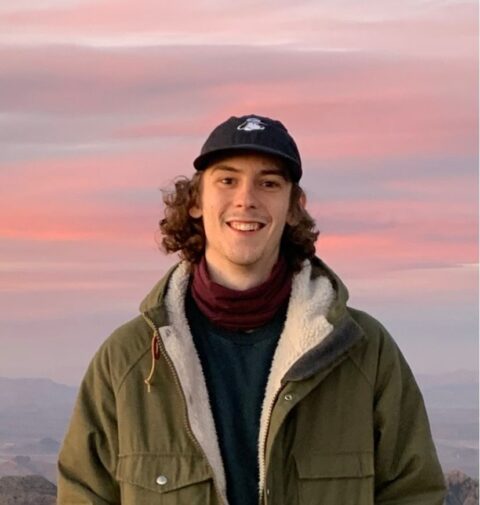This story has a breathless quality, that of trying to capture the way our thoughts meander and flow, moving through time. When you’re writing in this style, did you find yourself also writing it in a single go and editing it down from there or did you slowly make your way toward finishing this story?
I wrote the bulk of this story in a single go—a sprint, really. All the images were there; I just had to get them out on the page. Then, during the revision process, I played with the flow. I considered the connections between images, the color of consciousness, the shell and the kernel. I would move around a connecting phrase, like “I think,” then go back to the beginning. I often find myself doing that, even with much longer pieces: I make one small edit, then reread the whole thing. Rinse and repeat. I can’t separate the individual element from the whole.
The narrator of this story has an ambivalent relationship with John, their former boyfriend around intimacy, honestly, and sex. How do you see the relationship between love and desire playing out in your stories?
I always start with desire. What do people want? How does that change over time? I’m obsessed with the yearning, the shifting goalposts, the inevitable disappointments. But love. Love, to me, is about reparation. Let me tell you what I don’t mean by that. At this point, Thomas pulls out his phone and brings up a Hinge profile. He says: “I can fix him,” and laughs. I’m just kidding, of course, but the punchline speaks to something true: we tend to posit the lover as the perfect subject, trying to repair their beloved, the damaged object. But I think it’s the lover who’s really broken. They have regrets, they’re guilty, and that’s what drives them to tenderness and affection. In this story, the narrator is remembering the past as a site of praxis. What could I have done differently? What should I have said? Can I fix it? That’s memory. It’s sad. It’s hopeful.
In the end, the narrator seems conflicted about their relationship with John, the discovery of the sexual relationship, and the eventual consequences. To what extent do you think people know themselves or even understand themselves in relationship to other people?
I don’t know who I am, I never have, and when I discover some new fact about myself—that I like crushed pear juice, for example—I’m grateful, but also a little upset, because I’m forced to reckon with all the things I’ll never know, all the people I’ll never meet, all the places I’ll never experience. I think that’s what drives me to write. I want to hold on to what I do know and delineate the boundaries of my experience. And other people—they’re even more unfathomable! That’s OK, though. I wouldn’t want to know anybody completely—because it’s precisely what I don’t know about them that keeps me coming back for more. In the introduction to Short Talks, Anne Carson says, “You can never know enough, never work enough, never use the infinitives and participles oddly enough, never impede the movement harshly enough, never leave the mind quickly enough.” She’s right.
Why did you choose to start the story after the relationship was over as opposed to during the climactic moment?
In the heat of the moment, things happen to you once and for all, and you say whatever it is that you say, you do whatever it is that you do, you think whatever it is that you think, you do the best you can, basically. But memory happens over and over again. On command, against your will. And each time, you can say, do, think whatever you want. I had to start at the end because this isn’t a story about what happened; it’s about what it feels like to remember what happened.
Since the style and distance are such an interesting element in the story, why do you think this particular style is the right choice for this story? What did it open up for the narrative?
When I wrote this, I had just finished reading Septology by Jon Fosse. I hope that fellow fans of Fosse—Fosseheads, if you will—recognize the intertextual easter eggs, starting with the opening clause. Now, Septology is three volumes, seven novels, 672 pages long. The challenge for me was to hold a much shorter piece together using some of the same devices Fosse does. It’s tough to explain why an author matters to you, but I’ll try: Fosse’s work is important to me because he effectively dissolves the critical boundaries between past, present, and future, memory and imagination, desire and reality. I needed to do the same to tell this story. I didn’t want to cleanly separate the gym from the movie theater, or the narrator’s love from the sunscreen on his face, or any of those things from each other.



 The core workshop of SmokeLong Fitness is all in writing, so you can take part from anywhere at anytime. We are excited about creating a supportive, consistent and structured environment for flash writers to work on their craft in a community. We are thrilled and proud to say that our workshop participants have won, placed, or been listed in every major flash competition. Community works.
The core workshop of SmokeLong Fitness is all in writing, so you can take part from anywhere at anytime. We are excited about creating a supportive, consistent and structured environment for flash writers to work on their craft in a community. We are thrilled and proud to say that our workshop participants have won, placed, or been listed in every major flash competition. Community works.